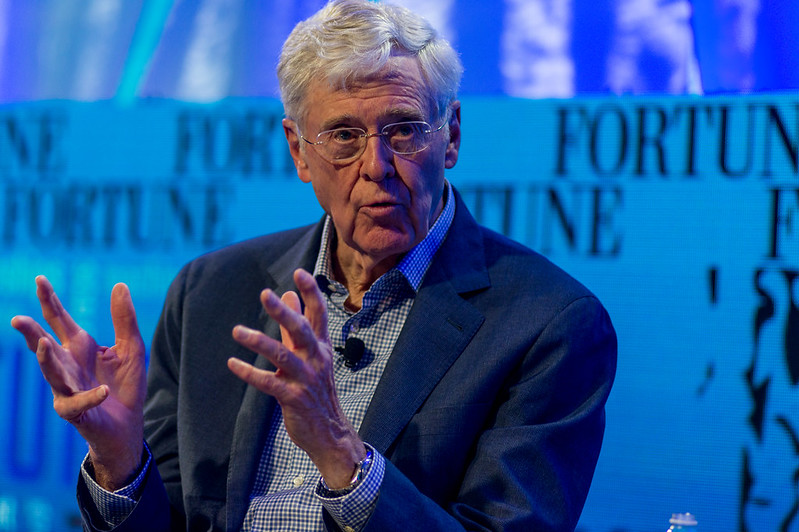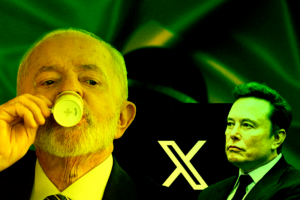Will America’s Billionaires Start a Second Civil War?
Oligarchs have aligned with the forces of reaction to preserve their grip on power, endangering the U.S. and democracy the world over. Charles Koch. (Fortune Brainstorm TECH / Flickr)
Charles Koch. (Fortune Brainstorm TECH / Flickr)
The current issue of The Atlantic magazine, founded itself in the years just before the Civil War, is ominously titled, “How to Stop a Civil War.”
If we are, indeed, on the brink of a second Civil War, it’s already being waged as a “cold war,” with the occasional armed skirmish being provoked by the so-called alt-right movement. And, as in the past, this will be a war by the very, very rich against the rest of America.
This is not the first time we’ve faced such a crisis as a nation.
Each time, forces of massive accumulated or inherited wealth have nearly succeeded in taking full control of our nation, replacing a democracy, where the will of the people is accomplished through their elected representatives, with a form of government where most government functions reinforce the power, wealth and control of the morbidly rich.
This system of government is among the most ancient, stretching back 7,000 years, and is known to political scientists as oligarchy. Aristotle put it in context: “Tyranny is a kind of monarchy which has in view the interest of the monarch only; oligarchy has in view the interest of the wealthy; democracy, of the needy…”
For oligarchy to totally take down democracy, only three things are initially needed:
- Control of (or substantial influence over) a critical portion of the media
- Legalization of bribery of public officials, so oligarchs can achieve majority control of the legislative process
- Control of the most critical parts of the court system so they can control legal processes
A fourth element, once the oligarchy is well established, is the formation of a police state, principally using selective prosecution against those agitating for a return to democracy.
Arnold Toynbee is said to have noted that “When the last man who remembers the horrors of the last great war dies, the next great war becomes inevitable.” Most warriors are in their late teens or early 20s; by the time they’ve died, three more generations have come of age, suggesting, if Toynbee was right, a four-generation gap between “great wars.”
In their book The Fourth Turning: What the Cycles of History Tell Us About America’s Next Rendezvous With Destiny, William Strauss and Neil Howe apply the theory to the United States. The Revolutionary War began in 1775; 86 years later in 1861, the Civil War began; 78 years later in 1939, America was combatting “the twin emergencies of the Great Depression and World War II,” write Strauss and Howe, adding: “Sometime before the year 2025, America will pass through a great gate in history, commensurate with” these crises.
The three crises did not simply come out of nowhere; cycles of events had been building for the preceding generations to create the context for each.
In the 1770s, foreign-aligned oligarchs controlled what we now call America; believers in democracy fought a war to overthrow that British oligarchy.
Four generations later, in the 1850s, massive wealth was controlled by a few thousand very large plantation oligarchs in the South. The South was politically and police-wise run as a full-blown oligarchy, while the North was still largely democratic (the “Gilded Age” Northern oligarchs wouldn’t fully emerge for another 30 years). The Civil War could thus be recast as a war between oligarchy and democracy, where democracy won by a whisker.
About four generations after that, in 1921, Warren Harding and his oligarch supporters took control of our federal government, leading to the “Roaring Twenties” (in which working people’s wages stagnated, but people at the top made out like bandits), and the Great Crash of 1929. The Republican Great Depression (what they called it until the 1950s) opened the door to Franklin Roosevelt’s “war” against the “economic royalists” (oligarchs), which succeeded in putting them, at least temporarily, in a box despite their explicit efforts, exposed by Marine General Smedley Butler, to overthrow him by force.
In 2019, it’s been about four generations since that battle—and the groundwork has been laid for another crisis.
In the 1970s, America’s oligarchs succeeded in getting enough of “their guys” placed on the Supreme Court to, in 1976 and 1978, legalize political bribery for the first time in American history. This opened the door to oligarchic control of all three branches of government via the Reagan Revolution.
All that was left was to get the populace to support a final transition to oligarchy, a task undertaken by oligarchs who controlled the media, largely Clear Channel/Rush Limbaugh and billionaire Rupert Murdoch with Fox News and the Wall Street Journal.
As a result, we are no longer a functioning democratic republic; we are now operating as an oligarchy.
The argument for oligarchic control is the same argument that’s been made by “conservatives” through history, from Thomas Hobbes to Sir Edmund Burke to Warren Harding and Donald Trump:
“With us in charge, we will keep you safe and happy and you really don’t need to concern yourself with the complicated work of governance. You don’t want to ‘tear down’ or ‘shake up’ the system: having a stable group of very wealthy people control the government has always led to the greatest level of stability and peace—look how stable Europe was for a thousand years when royal families and their landed gentry ruled. We’re the ones chosen by God or a brilliant DNA lineage to lead. Just go shopping and leave things to us.”
Starting in the 1980s, oligarchy was sold to us by “conservative” religious figures (“Saint Reagan,” G.W. Bush was a godly man, Trump is King Cyrus, John Calvin was right that being rich is a sign of God’s blessing so nations are best run by rich people), as well as oligarch-owned media.
Starting in the past decade, this sales pitch has extended itself to a massive social media ecosystem majority-owned by a handful of American oligarchs, some of whom have expressed confusion about democratic governance and all of whom have directly or indirectly bought control of large numbers of local, state and federal legislators.
This led us from the “oligarch-friendly” President Reagan, to the conversion, in 1992, of the Democratic Party via the Democratic Leadership Council to become “oligarch-friendly” itself (a legacy it’s today struggling to undo). In 2016, oligarchs like Robert Mercer and Charles Koch finally put an oligarch himself, Donald Trump, in the White House.
When, in 2015, I asked former President Jimmy Carter what he thought the consequences were of Supreme Court decisions like Buckley v. Valeo and Citizens United that made all this possible, he replied:
“It [the Citizens United decision] violates the essence of what made America a great country in its political system. Now it’s just an oligarchy, with unlimited political bribery being the essence of getting the nominations for president or to elect the president. And the same thing applies to governors and U.S. senators and Congress members.
“So now we’ve just seen a complete subversion of our political system as a payoff to major contributors, who want and expect and sometimes get favors for themselves after the election’s over.”
That same year, then-Vice President Joe Biden said, “you have to go where the money is. Now where the money is, there’s almost always implicitly some string attached. … It’s awful hard to take a whole lot of money from a group you know has a particular position, then you conclude they’re wrong [and] vote no.”
As former Vice President Al Gore wrote in his 2013 book The Future: “American democracy has been hacked. … The United States Congress … is now incapable of passing laws without permission from the corporate lobbies and other special interests that control their campaign finances.”
And, in 2015 while campaigning for the Republican nomination for president, oligarch Donald Trump candidly said, “I gave to many people, before this, before two months ago, I was a businessman. I give to everybody. When they call, I give. And do you know what? When I need something from them two years later, three years later, I call them, they are there for me.”
In 2014, researchers Martin Gilens and Benjamin Page (Princeton, Northwestern) demonstrated that we ceased to be a functioning democracy by classical definitions sometime in the late 20th century, and have been, as President Carter said, an oligarchy (my term, not theirs: they call it “Economic-Elite Domination”) since then.
The difference between now and the 1860s is that the oligarchic control is no longer regional; it’s national. Instead of the North and the South fighting each other, it’s now Free Speech TV viewers facing off with their Fox News–viewing neighbors.
The Koch oligarchy machine, for example, has branches in every state, and pretty much every county. Oligarchy-supporting media are ubiquitous.
And now Very Serious People are talking about the possibility of a second Civil War.
What they’re not pointing out, though, is that it won’t just be a war of white supremacists and Trump cultists against the rest of us, as they generally narrate, but a war between those comfortable with oligarchy (indeed, embracing it, as it promises them safety and stability) versus those who believe in democracy.
This is a crisis point for our nation as real and critical as those we hit in 1776, 1861, and 1932. In each of those three cases—roughly four generations apart—the oligarchs lost the battle. This time they could win.
America needs an honest discussion of what’s really going on in this country right now, what the real conflict is, and who the real players are (and why they’re playing). The conflict is playing out on a series of meta-layers (race, class, religion, regionality), all designed to conceal the real war the oligarchs are waging against democracy itself, and those conflicts will continue to intensify until one side or the other has won what is now still a “cold war.”
Then comes the threat of a real Civil War breaking out, and an informed populace is the best defense against it.
If the forces of democracy can succeed in seizing enough power to temporarily hobble the oligarchs, then they need to immediately restore local control to the media (undoing the 1996 Telecommunications Act and breaking up the media conglomerates) and reinstate a ban on the “right” of oligarchs to own politicians and political parties by overturning several Supreme Court decisions since 1976. Repairing the damage done to our court systems will take longer, but needs to begin immediately.
On the other hand, if the oligarchs decide to promote an actual “hot” Civil War on the forces of democracy—as Southern oligarchs did in 1861—then parts of America that are still functioning democracies (California comes to mind—there has been discussion of various “compacts” between the three West Coast states, possibly joining with a few Eastern Seaboard states) must consider some form of independence, whether it be “soft independence” like California declared when they established their own air quality standards or some form of partial independence or succession.
This moment of oligarchy-caused crisis is a time of great danger to America, and, thus, also to still-functioning democracies all over the world.
As oligarchs reach out and extend their control over nation after nation (now having seized, in just the past few decades, either soft or hard control over Russia, India, the Philippines, Hungary, Poland, Brazil, and dozens of other nations) the battlegrounds are shifting to Australia, the United Kingdom, the United States, and France.
Because the oligarch’s campaign is now international, a third world war is not impossible, particularly as China allies itself with the oligarch-controlled nations against those that are still functioning or nearly functioning democracies.
The stakes couldn’t be higher.
This article was produced by Economy for All, a project of the Independent Media Institute.
Thom Hartmann is a talk-show host and the author of The Hidden History of the Supreme Court and the Betrayal of America and more than 25 other books in print. He is a writing fellow at the Independent Media Institute.
Your support is crucial…With an uncertain future and a new administration casting doubt on press freedoms, the danger is clear: The truth is at risk.
Now is the time to give. Your tax-deductible support allows us to dig deeper, delivering fearless investigative reporting and analysis that exposes what’s really happening — without compromise.
Stand with our courageous journalists. Donate today to protect a free press, uphold democracy and unearth untold stories.






You need to be a supporter to comment.
There are currently no responses to this article.
Be the first to respond.